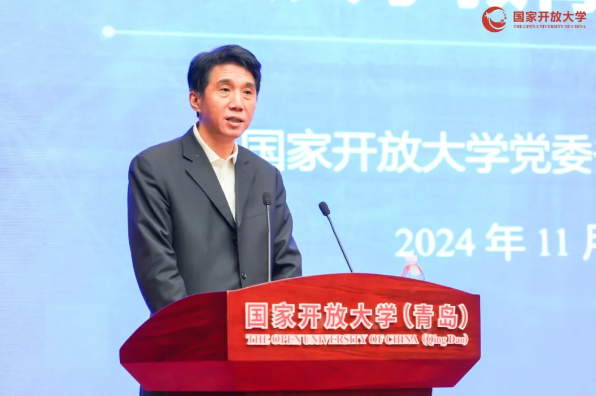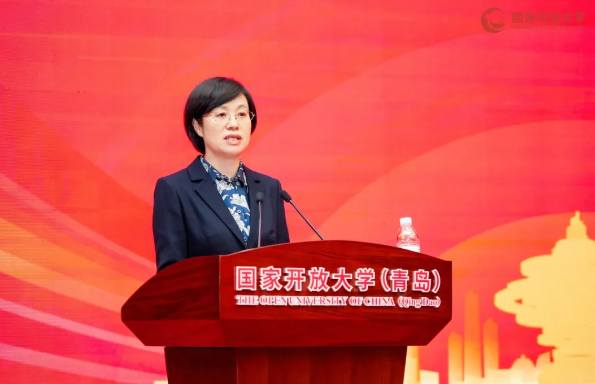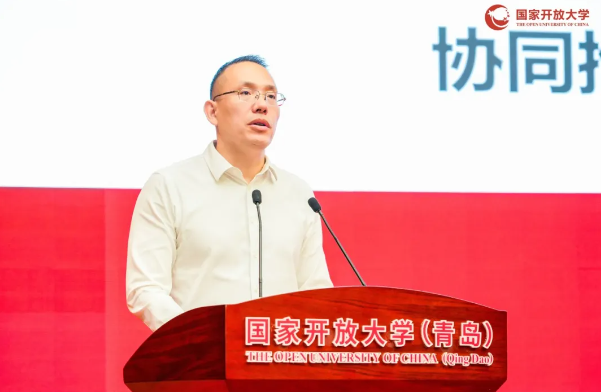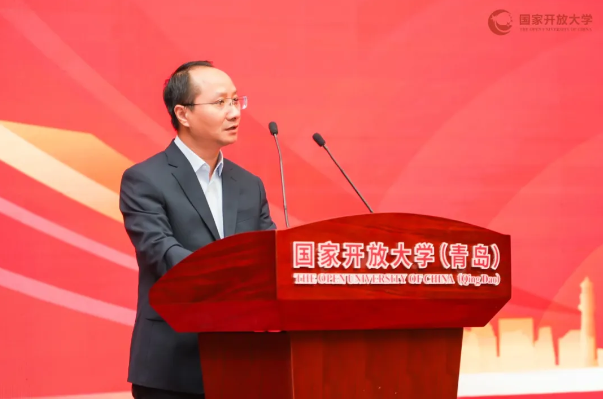 From 19 to 20 November, the Open University of China (OUC) held its 2024 Teaching Work Deployment Event and Plenary Meeting of the University Affairs Committee Meeting in Qingdao.
From 19 to 20 November, the Open University of China (OUC) held its 2024 Teaching Work Deployment Event and Plenary Meeting of the University Affairs Committee Meeting in Qingdao.
The meetings aimed to thoroughly study and implement the guiding principles of the Third Plenary Session of the 20th CPC Central Committee's and the National Conference on Education, fulfill the fundamental task of fostering virtue through education, strengthen the community of shared future of open universities, and focus on building a leading country in education. By leveraging digital intelligence and system collaboration, the comprehensive reform of education and teaching at open universities will be promoted in an integrated manner, thereby comprehensively improving the quality of talent cultivation in open education.
Zhao Yan, a member of the Party Leadership Group and vice mayor of Qingdao Municipal Government, attended the event and delivered a speech. Wang Qiming, secretary of the Party Committee and president of the OUC, presented a keynote report. Li Song, vice president of the OUC, gave a special report on teaching reform, and vice president Zhou Tianming announced the new members of the University Affairs Committee, including the director, deputy directors, members, and secretary-general. Wang Qiming, the director of the University Affairs Committee, issued appointment letters to the new committee members.

Wang Qiming delivered the keynote report

Zhao Yan delivered a speech

Li Song presented the special report

Zhou Tianming announced the new University Affairs Committee members
In his keynote report, Wang Qiming focused on four aspects: the National Conference on Education, the master plan for building a leading country in education, the three-year action plan for the Open University's future, and comprehensive reform of education and teaching. He emphasised that the Open University system must deeply study and implement the guiding principles of the National Conference on Education with a high degree of political, ideological, and action consciousness. He also highlighted the historical opportunity presented by the promulgation and implementation of the master plan for building a leading country in education. Wang Qiming outlined the key tasks for the Open University system over the next three years, emphasising the "3613" overall work approach. This includes implementing eight major projects: fostering virtue through education, comprehensive reform and innovation of open education, expanding and strengthening the development of the Seniors University of China (SUC), creating a digital university, improving the Open University system, constructing a digital foundation for a learning society, building a high-quality teaching workforce, and promoting the internationalisation of digital education. Additionally, two special projects will focus on lifelong education research and expanding the application of the credit bank.
Regarding the comprehensive reform of education and teaching, Wang Qiming proposed an integrated and coordinated approach to ensure aligned efforts and mutual reinforcement. The reform should be focused, practical, and implemented effectively, adhering to problem-solving, goal-orientation, and effectiveness. It should also emphasise collaboration and integration, prioritise students, place teachers at the core, leverage digital intelligence, and maintain a global perspective.
Li Song's special report, titled "Focusing on Talent Cultivation, Deepening Teaching Reform, and Collaboratively Promoting High-Quality Development of Open Education", reviewed the history and achievements of teaching reform in open education. He pointed out that the development of open education should meet the needs of national social and economic development, support technological advancement and industrial upgrading, and fulfill the public's expectations for educational development. This will contribute to building a leading country in education and a learning society. He emphasised the importance of maintaining quality as the foundation, promoting integrated and collaborative advancement, and empowering with digital intelligence, focusing on learners' needs, identifying key issues in teaching reform, and pinpointing critical paths for education and teaching reform. He provided a detailed interpretation of the key contents and measures in the "Implementation Opinions on the Comprehensive Reform of Education and Teaching in Open Universities through Digital Intelligence Empowerment and Integrated Coordination," covering aspects such as teachers, courses, resources, practice, and quality assurance.
Gu Xiaohua, director of the OUC’s Academic Affairs Department, presented the teaching work plan for 2025 under the theme "Comprehensively Deepening Comprehensive Reform of Education and Teaching to Promote High-Quality Development of Open Education".
During the meeting, 14 branch (college) representatives shared their experiences and exchanged ideas on various aspects, including comprehensive reform of education and teaching, reform of ideological and political curriculum construction, reform of teacher team development, reform of live and blended teaching, research and practice on learning conditions, training of industrial workers, reform of practical teaching, strengthening supervision and implementing the teaching process, degree thesis work, digital intelligence-empowered learning condition analysis, and shared professional construction and development.
The University Affairs Committee members, in group discussions, planned the key work for 2025 and the "15th Five-Year Plan" development, and discussed and revised major work items such as the "OUC’s University Affairs Committee Charter". The meeting emphasised that the University Affairs Committee is an essential part of the governance structure of the Open University system, showcasing institutional and systemic advantages. It serves as a platform for regional linkage, joint school development, and deepening exchanges and interactions. It is also a think tank for decision-making consultation, a guidance group for promoting development, and an action team for advancing reform. The attending members expressed their commitment to enhancing their sense of responsibility and historical mission, improving innovation and execution capabilities, further analyzing the situation, identifying problems, building consensus, and forming a cohesive force. They aim to grasp the new mission and tasks of the Open University in the overall context of building a leading country in education, play a leading role in building a learning society, and advance the integrated development of a world-class Open University with Chinese characteristics.
The participants also engaged in group exchanges to share their learning experiences from the meeting reports, analyzed the main contradictions and problems in teaching work in the context of digital transformation, and proposed constructive opinions and suggestions on promoting the development of the Open University system. They emphasised adhering to quality as the foundation, promoting coordinated advancement, and leveraging digital intelligence to drive comprehensive reform of all elements, processes, and aspects of education and teaching. All participants agreed that the meeting provided high-level strategic vision and has directional significance for the future development of the Open University.
The meeting was attended by Party Committee secretaries, presidents, vice presidents, heads of teaching and academic affairs departments, relevant management department heads from the Open University system, as well as representatives from various industry colleges, specialised colleges, and responsible persons from the headquarters' teaching, teaching management, and related departments.
By OUC